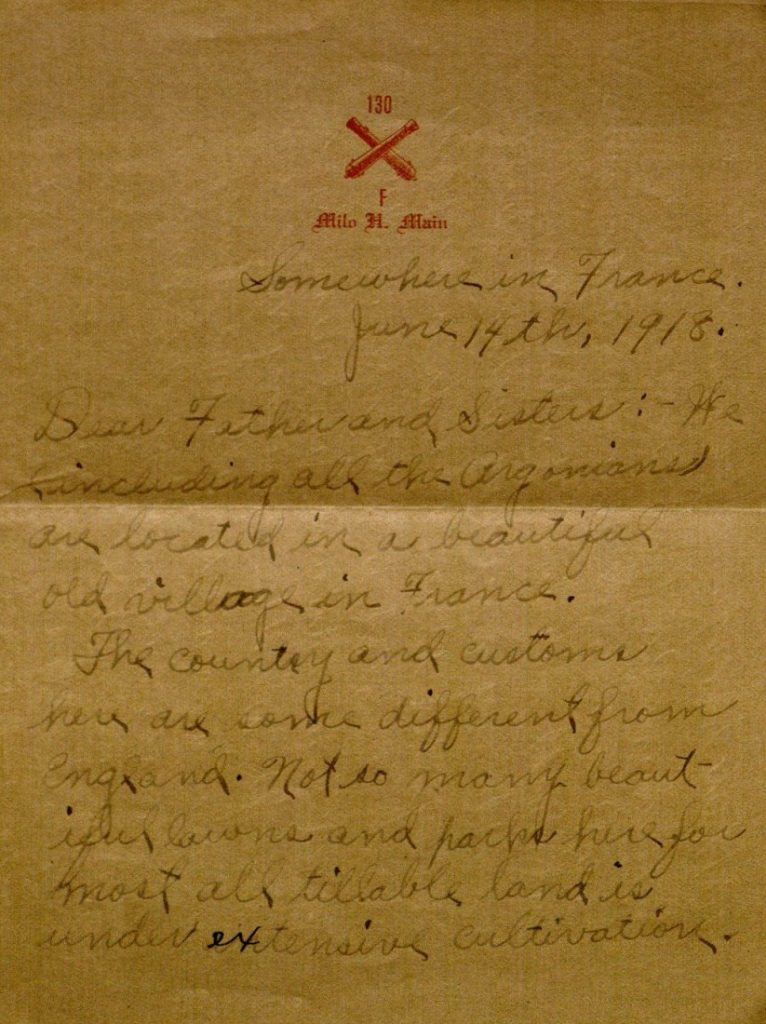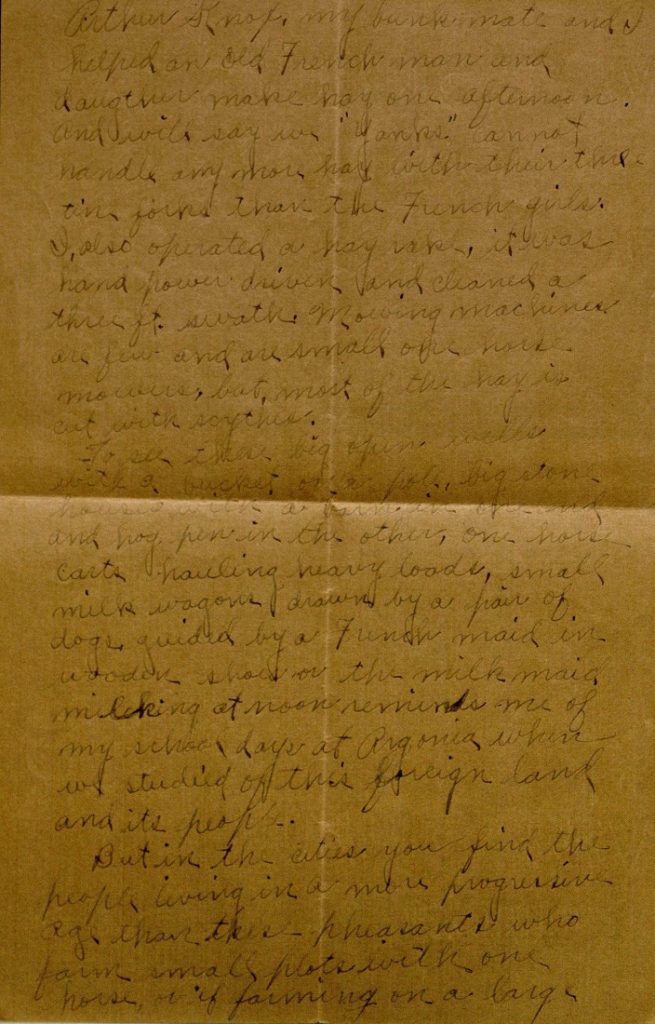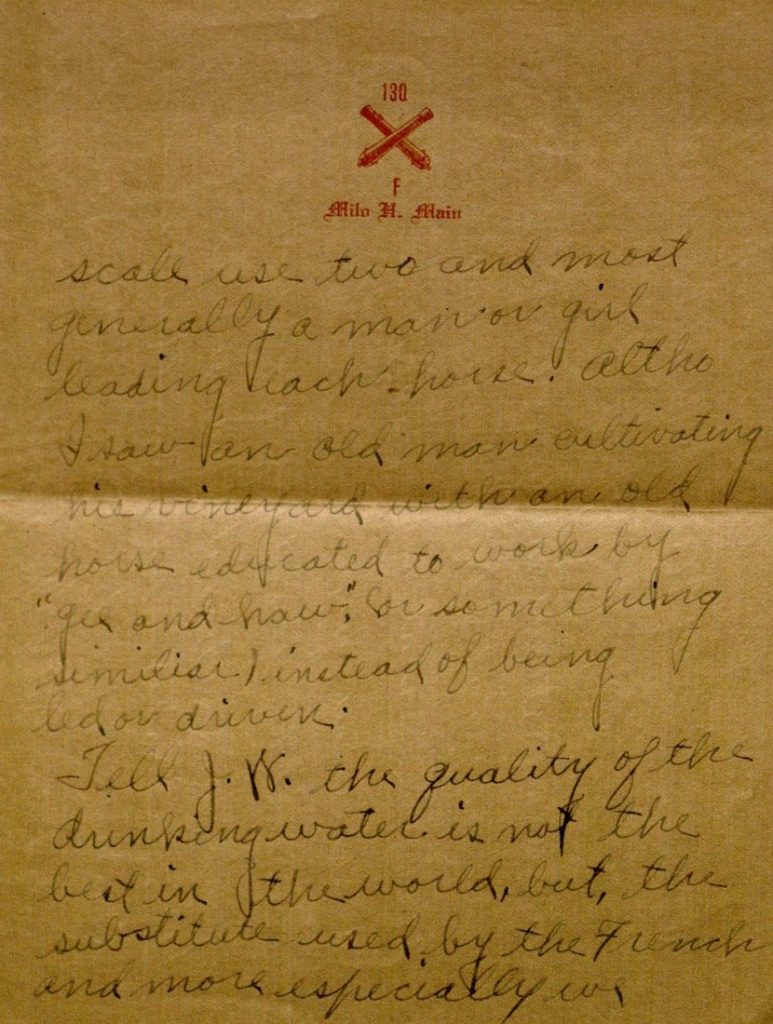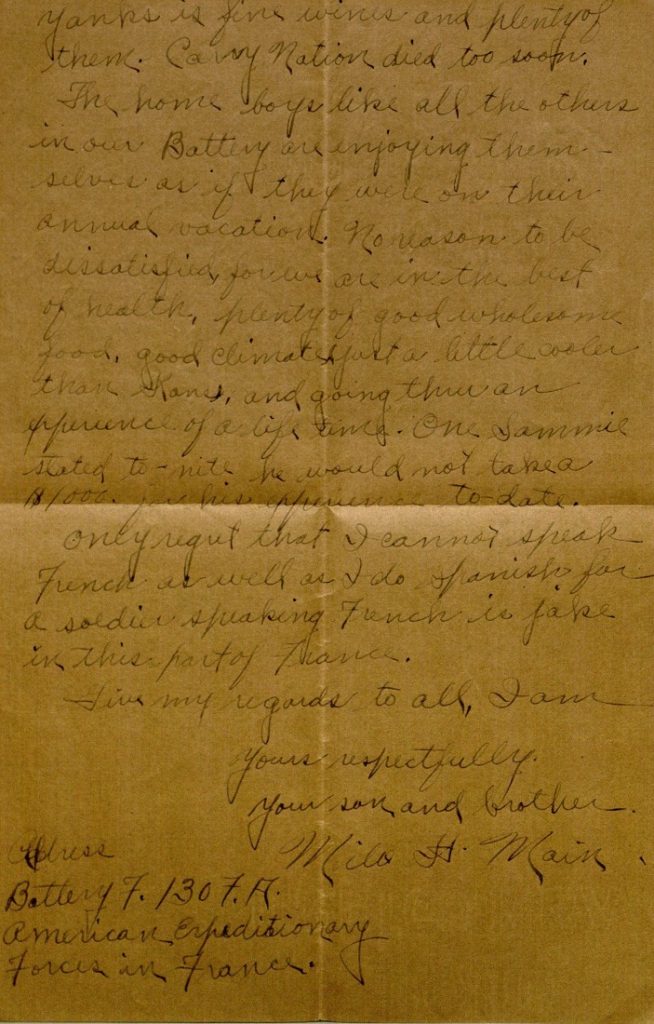World War I Letters of Milo H. Main: June 11-17, 1918
In honor of the centennial of World War I, this is the second series in which we follow the experiences of one American soldier: twenty-five year old Milo H. Main, whose letters are held in Spencer’s Kansas Collection. On Mondays we’ll post a new entry featuring selected letters from Milo to his family from that following week, one hundred years after he wrote them.
Milo Hugh Main was born in or near Pittsfield, Illinois, on November 21, 1892 to William and Rose Ella Henry Main. The family moved to Argonia, Sumner County, Kansas, in 1901. After his mother died in 1906, Milo remained in Argonia with his father and his two sisters Gladys (b. 1890) and June (b. 1899). His youngest sister Fern (b. 1905) was sent to live with relatives in Illinois.
As Milo reported to the Kansas State Historical Society in 1919, after graduating from high school he worked as a store clerk. He resigned in July 1917 and took a position at Standard Oil Company, possibly co-managing a gas station in Argonia.
Milo entered into military service on September 21, 1917. He served as a wagoner – a person who drives a wagon or transports goods by wagon – in Battery F, 130th Field Artillery. He was stationed at Camp Funston (September-October 1917) and Camp Doniphan (October 1917-May 1918). On May 19, 1918, he boarded the ship Ceramic in New York City and departed for Europe.
Milo wrote this week’s letter from “somewhere in France.” He describes the “country and customs,” especially comparing them with his previous observations of England and contrasting conditions on farms and in cities. “The home boys like all the others in our Battery are enjoying themselves as if they were on their annual vacation,” Milo says. “No reason to be dissatisfied, for we are in the best of health, plenty of good wholesome food, good climate (just a little cooler than Kans), and going thru an experience of a life time.”
Click images to enlarge.
Somewhere in France.
June 14th, 1918.
Dear Father and Sisters: – We (including all the Argonians) are located in a beautiful old village in France.
The country and customs here are some different from England. Not so many beautiful lawns and parks here for most all tillable land is under extensive cultivation. Arthur Knox, my bunkmate and I helped an old French man and daughter make hay one afternoon. And will say we “Yanks” cannot handle any more hay with their three tine forks than the French girls. I, also operated a hay rake, it was hand power driven and cleaned a three ft. swath. Mowing machines are few and are small one horse mowers, but, most of the hay is cut with scythes.
To see these big open wells with a bucket on a pole, big stone houses with a barn in one end and hog pen in the other, one horse carts hauling heavy loads, small milk wagons drawn by a pair of dogs, guided by a French maid in wooden shoes or the milk maid milking at noon reminds me of my school days at Argonia when we studied of this foreign land and its people.
But in the cities you find the people living in a more progressive age than these pheasants who farm small plots with one horse, or if farming on a large scale use two and most generally a man or girl leading each horse. Altho I saw an old man cultivating his vineyard with an old horse educated to work by “gee and haw,” (or something similar) instead of being led or driven.
Tell J.W. the quality of the drinking water is not the best in the world, but, the substitute used by the French and more especially we Yanks is fine wines and plenty of them. Carry Nation died too soon.
The home boys like all the others in our Battery are enjoying themselves as if they were on their annual vacation. No reason to be dissatisfied, for we are in the best of health, plenty of good wholesome food, good climate (just a little cooler than Kans), and going thru an experience of a life time. One Sammie* stated to-nite he would not take a $1000. for his experience to-date.
Only regret that I cannot speak French as well as I do Spanish for a solider speaking French is jake** in this part of France.
Give my regards to all, I am
Yours respectfully.
Your son and brother.
Milo H. Main
Address
Battery F. 130 F.A.
American Expeditionary
Forces in France.
*”Sammie” or “Sammy” was British slang for a U.S. soldier in World War I; it was a reference to Uncle Sam.
**”Jake” was slang meaning “excellent, fine.” From 1914, American English, of unknown origin.
Meredith Huff
Public Services
Emma Piazza
Public Services Student Assistant
Tags: correspondence, Emma Piazza, Kansas Collection, Meredith Huff, Milo H. Main, World War I




